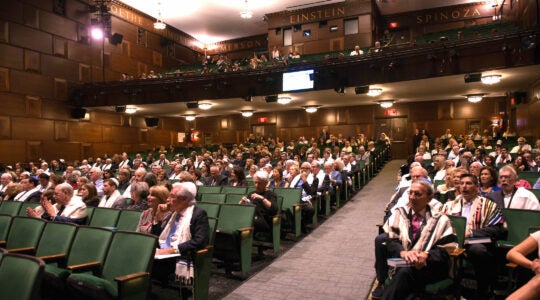Financial headlines are heralding hard times and Jewish newspaper headlines are, too; the American Jewish Joint Distribution Committee, an international relief agency, is cutting 60 jobs, the Jewish federation umbrella group United Jewish Communities is slashing at least 37, and the Jewish Theological Seminary, facing a $2.2 million budget shortfall, may trim its teaching staff.
Some venerable Jewish nonprofits and programs are closing their doors completely. The resettlement agency the New York Association for New Americans has just shut down, as is a much-loved program in the southern Israeli town of Arad, originally run by the World Union of Jewish Students and recently taken over by Hadassah.
Big picture, what’s going on here? Do these shakeups and retrenchments herald a major contraction in the Jewish not-for-profit world? Or are they mere blips on a graph of the upward growth that so many Jewish organizations like to tout?
“It’s scary out there,” says Mark Charendoff, president of the Jewish Funders Network, a New York-based organization with 800 members that advises and educates Jewish family foundations and philanthropy lay leaders and staff.
The sense of shakiness spans all economic sectors, he points out. The collapse and government bailout of Bear Stearns, the Manhattan-based investment bank and global securities and trading firm, and loss of 15,000 jobs, there continues to send ripples through New York City’s entire economy.
“Whether you’re speaking to people in the not-for-profit world or for-profit world it’s a time when people are nervous, and for good reason,” Charendoff said. “There’s a lot of uncertainty. The difference is that the not-for-profit Jewish world is just so small, and at times like this you realize just how small.”
Is what’s happening among Jewish nonprofits mirroring the situation in the philanthropy world in general, or is it worse?
Stacy Palmer, editor in chief of the The Chronicle of Philanthropy, says she believes things may be worse among Jewish nonprofits than generally in the world of philanthropy.
“It’s going more slowly in the general nonprofit world,” she said. “The big groups [in the general nonprofit world] are raising a little bit less money but are not being forced to make cutbacks. But smaller groups are being squeezed,” she said.
There is regional variation in the economic impact on nonprofits. In states where government budgets are being cut, many nonprofits are feeling the pinch of that change. And in places where gasoline prices are higher and people are more car-dependent, like rural areas, it’s also making an impact. Volunteers now are less willing to drive to their commitments, she says.
Though there “really are differences” from one geographic area and type of group to another, cutbacks among not-for-profits “are not widespread,” Palmer says.
Others say that the recent retrenchments have less to do with the economy and more to do with the struggles of Jewish organizations to adapt to changing times.
“I don’t think the fact that some number of Jewish organizations are having financial problems is a function of the economy, hard times or some general wave in Jewish organizational life. It’s about those organizations. There’s a whole host of organizations that are doing quite well,” says Gary Tobin, president of the Institute for Jewish & Community Research, based in San Francisco.
“When the vast majority of Jewish organizations are doing well or holding their own and there are a few that aren’t, you’re probably getting a shaking out of organizations that were already in trouble, and in hard times they’re going to be in more trouble.”
“If your mission is not exactly in line with where people are, it doesn’t take much to push it over the edge,” he says. “UJC was having troubles in economic good times. JTS was starting to have trouble in economic good times. It would be nice to lay the blame on the stock market, but that’s an easy way out. It’s about these organizations.”
Overall, says Simon Greer, president and chief executive officer of the Jewish Funds for Justice, he does not believe that a period of widespread retrenchment at Jewish organizations is at hand.
“I hear anxiety out there, but I haven’t heard people say they’re cutting back,” says Greer. His group organizes and funds community development work.
Both his organization, the Jewish Funds for Justice, and Charendoff’s, the Jewish Funders Network, have been growing and anticipate continued expansion in the coming year. The latter group is now opening its first-ever Israel office and plans to open two or three regional offices around the U.S. for the first time as well.
Even so, Greer says, “It hasn’t been easy fundraising in the last 90 days. It’s been tough. People are feeling like each dollar has to go further in their charitable giving.”
What’s more, the future of non-profit fiscal health remains unpredictable. Even if the current shakeup among historic Jewish groups isn’t about the economy, donors and executives of non-profits remain worried about near-term stability and its impact on their organizations.
The uncertainty is leading to “a self-imposed conservatism,” says Charendoff. “You can characterize it as being prudent or as being overly cautious.”
Whatever the reason for this new conservatism — whether a real shortfall in dollars coming in, or a psychological wariness about what the coming months hold – it does mean that in many organizations, newly planned positions are not now being filled and new programs planned for the fall are being put on hold.
The result is that “if you think the Jewish not-for-profit community is doing God’s work, which I personally do believe, then less of God’s work is going to be done,” Charendoff says.
“Delivering service to people who are needy or hungry, providing emotional support, delivering a quality education, raising money for Jews in need, tending to the environment, that all requires financial resources to create programs and educational materials and human resources. If people are either retrenching or just not spending, that’s a very real impact.”
According to one of the 37 employees whose job was recently axed by UJC, in response to Jewish federations’ demands that the organization cut $3.6 million from its budget, the wiping out of so many positions there “cuts to the bone” of the work this central group can accomplish.
“Until the economy gets straightened out it’s going to be a rough road for a lot of non-profits, not just federations,” the former staff member said.
The New York Jewish Week brings you the stories behind the headlines, keeping you connected to Jewish life in New York. Help sustain the reporting you trust by donating today.




